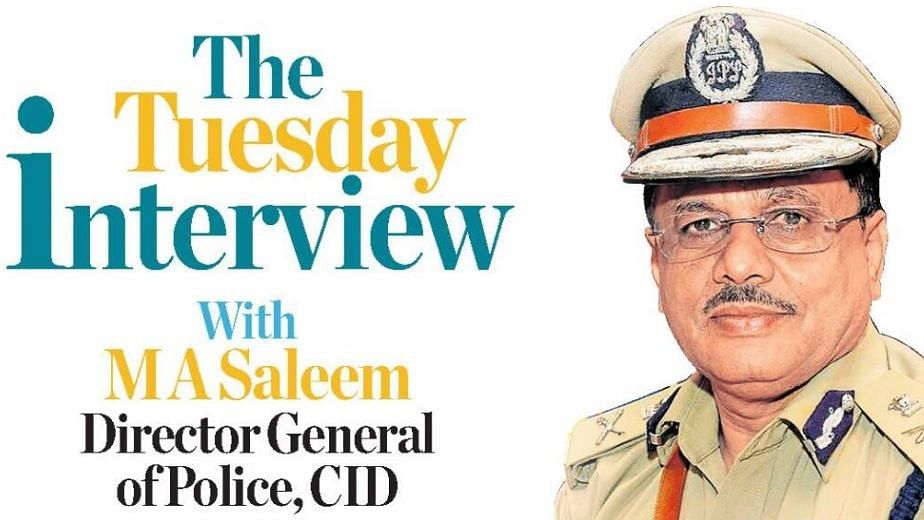
The Tuesday Interview: M A Saleem, Director General of Police, CID
DH Illustration
The Criminal Investigation Department (CID) of Karnataka has been in the news frequently over the last few months, with the state government tasking it to crack every high-profile case that surfaces. While critics may argue that the CID is summoned when the government doesn't want a case solved, the agency has expedited investigations in many cases and filed chargesheets promptly.
The CID has enhanced its capabilities by forming the Deposit Fraud Investigation Division and Criminal Intelligence Unit, aligning with the evolving nature of crime.
In an interview with DH's Nina C George, M A Saleem, Director General of Police, CID, Economic Offences and Special Units, discusses the challenges facing the CID and how it's evolving to tackle crime and secure convictions with watertight chargesheets. Excerpts:
Several high-profile cases have landed at CID's doorstep...
The CID is a professional investigation agency, and all the cases referred to it are investigated in a professional manner. We have some good facilities in terms of strong technical support, a cyberforensic laboratory of our own, and our legal team. Cases are investigated in an elaborate manner and then sent to court for prosecution. It is a water-tight process.
But there is always an impression that when a government hands over a case, there are two reasons: either to put the case in cold storage or because it is a case of public importance. Why and how is it that the CID is saddled with these two extreme images?
Cases are always investigated in a systematic manner, particularly those relating to economic offences, because they need a lot of time. We study the documents and conduct forensic audits for any financial irregularities. We also scrutinise the layering of fraud amounts, which could involve hundreds of accounts. One has to understand the case, especially those related to misappropriation, forgery, or cheating. All this calls for a thorough and scientific investigation.
Two verticals—the Deposit Fraud Investigation Division (DFID) and the Criminal Intelligence Unit (CIU)—have been formed. Could you tell us about both and how they increase efficiency?
Many cases referred to the CID pertain to deposit frauds where scamsters lure gullible citizens into depositing money and vanish. There is a need for a focused investigation, especially after the enactment of the Banning of Unregulated Deposit Schemes Act (BUDS Act), where cases require more expertise. The Standard Operating Procedure for such cases makes it easier to investigate and crack them. This is where the expertise of the DFID comes in. The CIU engages in the collection of intelligence about crime and criminals; it focusses on the potential crimes likely to happen, particularly those related to economic offences. The information collected is provided to the concerned city or district police. The unit also looks at drug or human trafficking cases and collects intelligence regarding the dossier criminals.
This is the first time that so many Special Investigation Teams have been created at the CID.
The five Special Investigation Teams (SIT) that have been formed conduct investigations in an impartial way. These cases are challenging for the officers in terms of the collection of evidence and gathering intelligence. But, whatever the case may be, officers are drafted to carry out an investigation quickly and complete it within the deadline without compromising on the quality. We have completed all the investigation of most of the SIT cases by maintaining objectivity so that the credibility of the organisation is upheld at all times.
Could you tell us about the specific technology used to crack complicated cases where evidence needs to be collected from devices, especially those involving high-profile cases?
While investigating most of the cases, whether high-profile or not, technology is a major component, including cyber crime investigation tools such as voice recognition systems, social media analysis, dark Web intelligence, and chain analysis. We take the help of the forensic science laboratory after getting permission from the courts, and we also do an evaluation of the evidence in our own lab and facilities at CID. Sometimes, we take the help of the central forensic lab and the Gujrat Forensic University lab for retrieval of lost data.
How did you manage to dispose of nearly 400 cases in just one year, bringing the CID's caseload down from 900 to less than 500?
Frequent reviews of progress in the investigation have helped us reduce the pendency. Constant follow-ups and a victim-centric approach are key to a speedy investigation. Our focus on a victim-centric approach, where we concentrate on getting speedy justice for the victim, has helped us to conduct the investigations in a judicious and speedy manner. If the investigation is delayed and the victim does not secure justice, then the purpose is lost, and they will lose confidence in the system.
How does the CID keep pace with cybercriminals' evolving modus operandi?
The Centre for Cyber Crime Investigation Training and Research (CCITR), a collaborative project of CID, addresses the cybercrime challenges. It helps in capacity building to combat cybercriminals through training and research. At CCITR, we are training our police officers, members of the judiciary, and prosecutors in all spheres of cybercrime investigation and prosecution, such as detection, collection of evidence, and appreciation of digital evidence, which will help ensure justice to victims of cybercrimes.